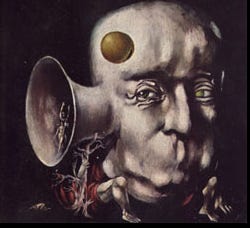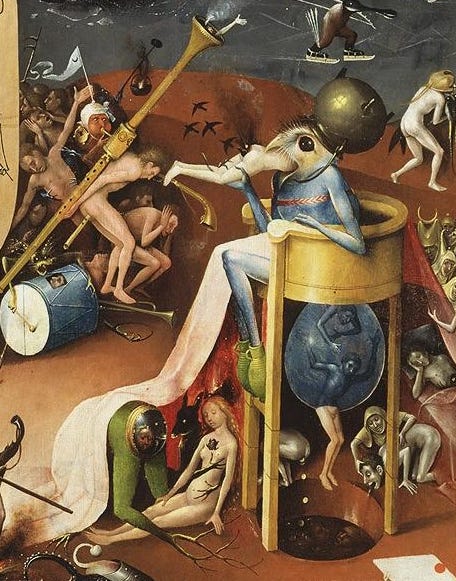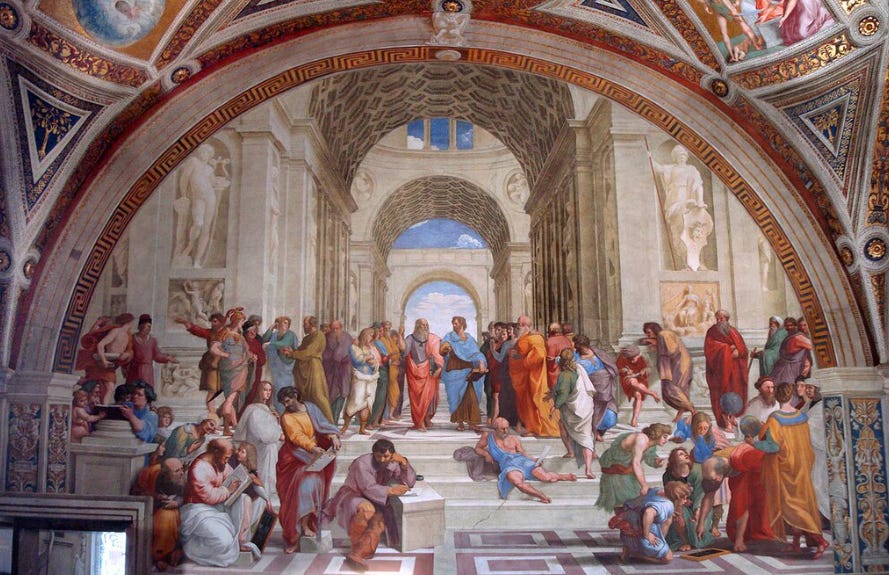[REPOST] I have no mouth
and I must scream
Removing the paywall for this post and reposting. Start of Fall semester and all, seems salient.
That’s how I feel at this moment as I consider the state of the arts in education. And, truthfully, we’re not that far off from Ellison’s techno-nightmare.

So why the hopeless malaise? It started after I attended an exhibition today: an MA student’s thesis gallery show. Her metalsmithing and jewelry were impeccable. What’s more, she was so nice and so approachable. She was thrilled to be there and happy to talk with anyone interested in her art, but without a hint of arrogance.
I mentioned this to her thesis chair, who responded, “She’s a high school art teacher.” And then it all made sense.
I wanted to reach out to the artist to see about an interview for my podcast, Beyond the Canvas, so I navigated to her school district’s website. I spent some time looking at their arts page, and was really pleased to see an entire section devoted to “Why is studying art and music important.” (I’ll share some of the links they included, below.)
But reading over it really just made me sad.
Because from where I’m sitting, art and music continue to be the last thing that anyone considers to be important for an education. Sure, there are exceptions, and those exceptions are amazing, but … it’s really hard to think things are going well for arts education. . .
K-12 schools are cutting or pausing art and music classes for the academic year as a defense against austerity
Art school after art school is closing across the United States
The MFA at my own university of employment was placed in moratorium
And we’re not alone: universities and colleges from the Atlantic to the Pacific are trimming programs, particularly the arts
And it’s not just the arts: it’s the humanities, too, and languages, and, perhaps the scariest harbinger, libraries.
I sincerely do not believe that the importance of libraries can be overstated. They are vital to a society’s safety from collapse.
Look, I’m not trying to be hyperbolic nor am I trying to be alarmist. And I will be the first to admit that I am only sharing my opinion. To that end, here are some things I owe directly to an arts education (and humanities, etc.):
I learned to be task oriented and accountable; how to receive critical feedback; how to persevere; and how to work with others towards a major project thanks to the music programs in my middle and high schools.
My understanding and correct application of English grammar is better for having taken four years of French in high school.
My English vocabulary is also larger thanks to French, and because of a module I had in a high school English course on Greek and Latin roots.
My close friend’s mental health is stronger because of art lessons. And her love of music is so strong that it has motivated her to overcome her anxiety to do what she loves.
My best students can be put into one (or two or even three) of three categories: artists (including musicians, visual artists, and other performing artists); athletes; and military members. Those have a common thread; see my first bullet point.
My life is deeper and richer thanks to art. My friendships are deeper and richer thanks to art. My relationship with my God is deeper and richer thanks to art.
Growing up, I spent most of my summers at the local county library, to which I would bike almost every day. It opened up my world in a way nothing else could; I love my hometown, but pre-Internet, small-town Wyoming - though wonderful - tended to be one dimensional. Only the services provided by a library could combat that one dimensionality.
I grew up reading an enormous amount of science fiction and fantasy and poetry; as an adult, I have published ten books and a dozen refereed articles, as well as done freelance work as a copy editor. I write well because I have read and read so much.
Our lives are the stories we tell ourselves; arts give us the tools to “read” those stories, and to change the telling of them when necessary.
I don’t think anything can replace the arts in education and still get the same life-changing results. Because the arts teach in a way that nothing else does: through play1. As my painting instructor once said: “Play in art is important.” It is. Because it tricks us into thinking we’re only having fun when, in fact, we are learning, growing, and creating. Or maybe that’s no trick at all.
We had given AM sentience. Inadvertently, of course, but sentience nonetheless. But it had been trapped. AM wasn’t God, he was a machine. We had created him to think, but there was nothing it could do with that creativity. In rage, in frenzy, the machine had killed the human race, almost all of us, and still it was trapped. AM could not wander, AM could not wonder, AM could not belong. He could merely be. And so, with the innate loathing that all machines had always held for the weak soft creatures who had built them, he had sought revenge.
One exception would be athletics.
nb Thank you to Sharon Massey for looking over an earlier draft of this post and providing feedback.



